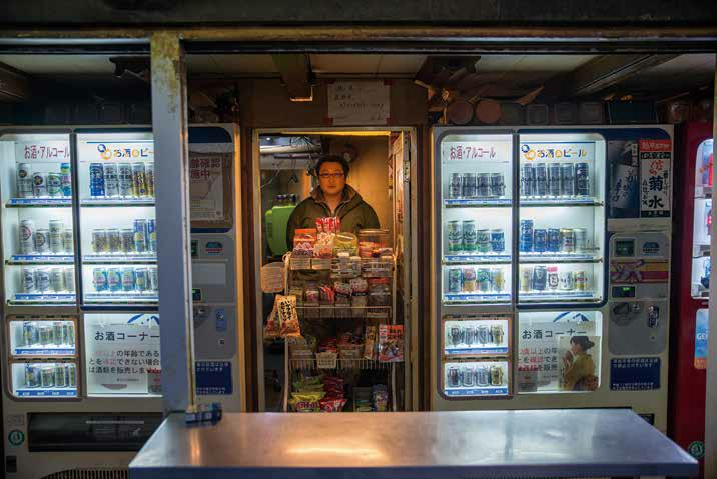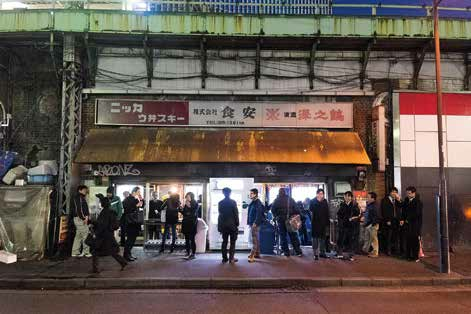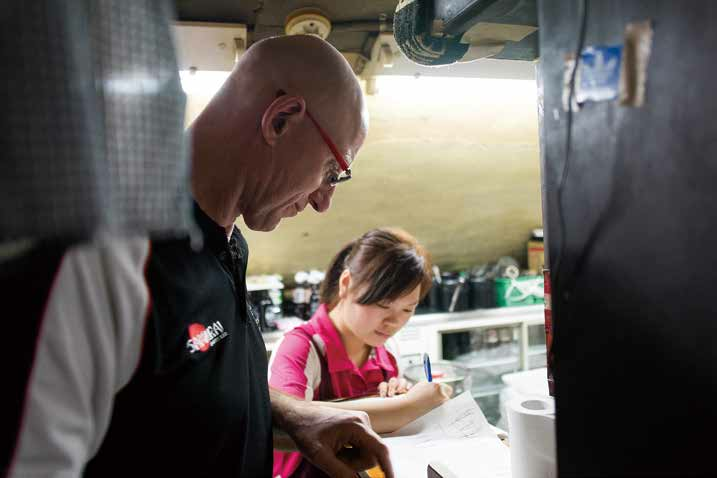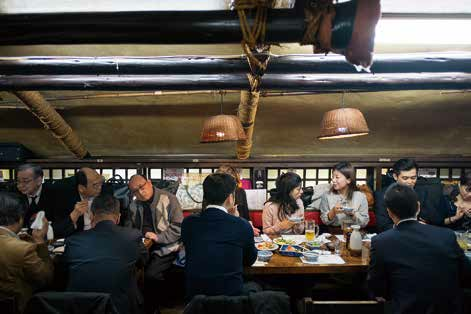Issue:




Kiyoshige Ozawa (above left) and his employee-free bar, Shoku-an (bottom left). Andy Lunt (above right) oversees the friendly digs of the Shin Hinomoto izakaya (left)
Text by John R. Harris with reporting by Maya Shibata Photos by Said Karlsson
Since moving to the Denki Building in 1976, the FCCJ has been perched on the border of blue-chip Marunouchi and the seedy magic of Yurakucho-under-the tracks, the last trace of the raucous postwar district in which the Club was born. Now, as we mull over a move to new digs, Club Members may be witnessing the last days of our much-loved, rough-and-tumble friends across the street.
According to Andy Lunt of Shin Hinomoto the eatery across the street that combines Tokyo’s best seafood with what may be the city’s most down-at-heel décor earthquake-proofing reconstruction of the elevated Yamanote-line tracks may spell the end for all the businesses below.
“We sublet this place from a landlord who owns the space below the arch,” Andy says. “But the arch itself belongs to JR and the landlord actually pays rent to JR for the roof. They can’t evict us full-stop, but they can force us to move out during the construction period which could take years. And since the JR have legions of lawyers, there's nothing you can do. We know they have to do it at some point, but neither we nor the landlords can get any information on when they plan to do it.”
Doing business under the tracks has been precarious ever since the postwar days when it was a black market rife with gang activity. Andy was told by his father-in-law (whose father started the business in 1945) that the landlord’s rights to the site were granted by a U.S. Army officer sent by the nearby GHQ to stamp out turf battles in the market.
“Apparently, he just decreed on-the spot ‘this one’s yours, that one’s his’ and somehow it took on the force of law,” Andy says.
Kiyoshige Ozawa tells a similar story. He’s the proprietor (the friendly young guy with glasses) of Shoku An, the vending machine bar next to Shin Hinomoto that’s the last respite for local smokers.
“My grandfather started this business in 1948,” Ozawa says. “I don't know all the details, but it seems he was helping the government somehow, distributing food to people who were hungry after the war. That led him to start his own catering business, which my father took over and ran until he had to lay off all his workers after the bubble burst. That’s how this vending machine idea started: he figured we could run a business without employees.”
Like Andy, Ozawa is concerned about the future. “Our lease comes up for renewal in four years. JR haven't told us anything, but we assume they will want to strengthen the tracks before the 2020 Olympics, as they are doing up the line near Okachimachi.”
For Andy, the worst part is not knowing what to expect. “I want to renovate this place before the Olympics,” he says. “My landlord isn’t into it, so I’d have to do it myself. But how can I spend that kind of money when we could be told to move out tomorrow? Even if they forced us out for only six months it’d be tough. JR has no interest in talking to me, and they won’t even talk to my landlord. And I tried asking the Ward Office, but I still can’t get any information.”
John R. Harris is a speechwriter and freelance journalist based in Onjuku on Chiba’s Pacific coast.
Said Karlsson is a freelance journalist and photographer reporting on Japan for Swedish media.

